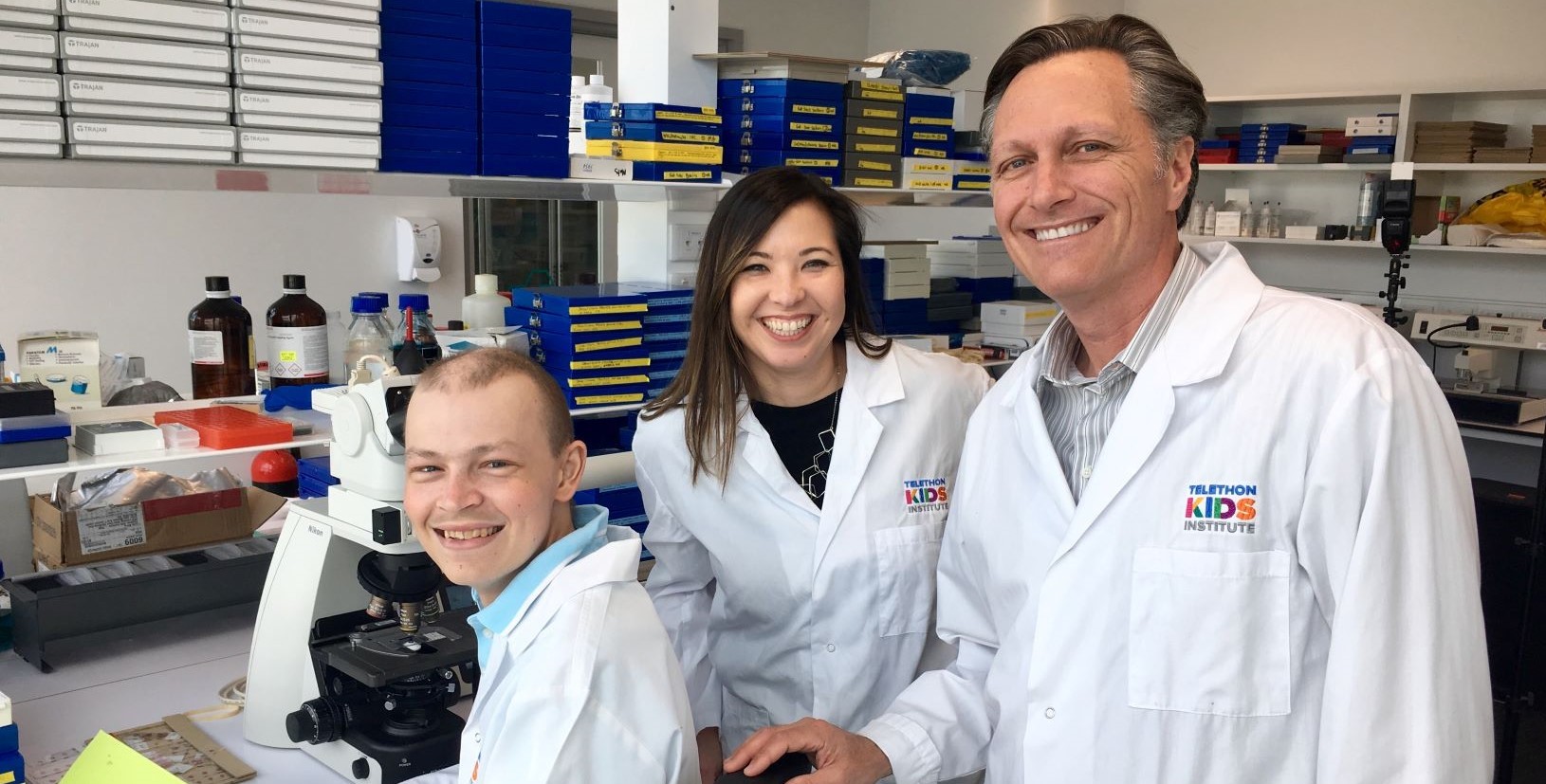An international clinical trial led by The Kids Research Institute Australia Cancer Centre is trialling a drug which could increase cure rates for aggressive forms of childhood brain cancer.
Baxter Hutchinson was diagnosed with two life-threatening brain tumours at the age of 17 – receiving the devastating news that one of the tumours was inoperable. Since then he has undergone surgery, more than 40 rounds of radiotherapy and seven rounds of chemotherapy. Now in remission, he credits being on a clinical trial with saving his life.
 Baxter with Dr Raelene Endersby and The Kids Research Institute Australia Director Jonathan Carapetis
Baxter with Dr Raelene Endersby and The Kids Research Institute Australia Director Jonathan Carapetis
“The clinical trial was highly important in my journey as the treatment not only managed to reduce the size of my tumour but it completely eliminated it, which is quite rare in brain cancer patients,” Baxter said. “The trial basically saved my life.”
Baxter also believes he won the location lottery – knowing none of it would have been possible if he had been based elsewhere in the world.
“I was incredibly lucky to have access to a clinical trial specific to my type of brain tumour as it was only available in America, Germany and right here in Perth,” he said. “Some patients like myself are not fit to fly, so having access to clinical trials in WA is vital to improve the survival rate in brain cancer here.”
Now, The Kids cancer researchers are delivering a new clinical trial to help kids like Baxter around the globe – and it is all being led from WA.
The SJ-ELIOT trial, running in Australia and the United States, is the first to test the safety and effectiveness of the drug prexasertib in combination with chemotherapy treatments for medulloblastoma – which accounts for about 20 per cent of all childhood brain tumours. It’s hoped the novel drug combination will increase cure rates for aggressive forms of childhood brain cancer.
Head of the Oncology and Haematology Department at Perth Children’s Hospital and The Kids researcher, Professor Nick Gottardo, is leading the clinical trial with fellow The Kids co-head of brain cancer research, Dr Raelene Endersby. He said approximately 30 per cent of children diagnosed with medulloblastoma died of the disease and for those that were cured, survival came at a heavy cost.

“Far too many of these children are dying of this brain cancer, and those that are saved tend to have permanent, life-changing side effects due to the intense nature of the treatment needed to save them,” Professor Gottardo said.
“Curing them requires surgery to remove the tumour, then radiotherapy to the whole brain and spinal cord, and then intensive chemotherapy.
“Some of the side effects are immediate, like losing hair, being susceptible to infections and having difficulty walking, but then there are the more long-term side effects which can affect intelligence, memory, attention, puberty and growth – there are a multitude of problems that are not reversible.
“We know we can change that with research, by finding smarter drugs and smarter treatments that are more effective on the cancer and cause less collateral damage on the body.”
A standout amongst thousands
Professor Gottardo and Dr Endersby hit upon prexasertib while screening thousands of drugs over a seven year period for their potential to kill medulloblastoma cancer cells. Prexasertib emerged as the standout.
“The way prexasertib works is by preventing cancer cells from repairing themselves once they’ve been damaged by chemotherapy,” Dr Endersby said.
“Radiation and chemotherapy work by damaging the DNA in the cancer cells, but those cells can just fix that damage and keep on replicating. When we give the cells prexasertib at the same time as chemotherapy we find they’re not able to repair their DNA, and therefore the cells undergo apoptosis, or cell death.”
Collaboration the key
The prexasertib discovery and subsequent trial have showcased the power of collaboration, both between clinicians and researchers – working hand-in-hand to find answers – and with community organisations willing to support the ongoing work needed to make progress. The researchers have been backed by a number of charities focused on funding cancer research, including The Pirate Ship Foundation, Perth Children’s Hospital Foundation, Cancer Australia, Cancer Council WA, Cure Brain Cancer Foundation, The Kids’ Cancer Project, and the WA Child Research Fund.
“That community support remains essential because as excited as I am about this trial, it’s not suddenly going to cure every child with medulloblastoma – it will be a stepping stone,” Professor Gottardo said.
“I’m hoping it will become another drug that we can add to our therapies that will increase survival. Then I would like to apply this as a model so we can bring other new therapies into the clinic using the same approach.”
